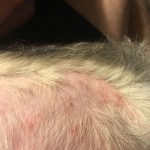My dog has scratched himself raw. No signs of fleas anywhere. Any ideas? I can’t get him to the vet till next week.
Comments
My bunny has been acting very strangely lately. We put her harness and leash on her and took her to the park. We spent a lot of time with her. Then, people were watching her (family) and I wasn’t there so I don’t know what happened. When we brought her back, she looked really scared. My family said that when I left, she just sat there staring at everyone. At home, she hasn’t been eating as much as she used to. She would practically snatch the food from my hand. Now, she sniffed, took a bite and walked away. We tried again with her favorite food, but she didn’t eat it. She’s been laying and sleeping way more than usual (practically all the time). During training sessions with me, she used to care and loved it. Now, she just sat there staring me for a while. She’s also been super scared. Every time I walked in the room, she’d jump up to me, now she runs away at the slightest noise. She’s also been pretty aggressive. She was laying and I reached over to pet her. She let me pet her for two seconds before she reared back on her hind legs and tried to scratch me. Hard. She’s also pretty stressed (her breathing is really fast). What is going on with her?
Comments
Hi pawbly-
If a dog had pneumonia as a puppy, are there residual effects when they are older? I’m curious because one of our dogs, Riva, apparently had pneumonia when they first got her to the rescue. She is 2 now and seems to tire easily. Loves to play and run, but not for too long. Curious if there is a correlation or if she really is just a diva?
Comments
My cat has squamous cell carcinoma under and behind her tongue. She’s on a feeding tube, and can’t use her tongue for lapping milk or grooming. I’ve been to the cancer vet, and I know she only has 4-6 months. (I’m trying to accept it, but it’s so hard). She sometimes ‘works’ her mouth, opening & closing it, moving her tongue as best she can – I think she knows things don’t feel right and she’s trying to rearrange them. Would it make her more comfortable to have some of the tumor & part of her tongue removed? Or would that just make distress her? Would it just re-grow anyway?
Comments
Good morning pawbly friends. Looking for advice on feeding multiple dogs at once. Feeding time has never been an issue before, but we’ve only had two at a time. We have a third now and it is proving to be a little hairy at times. Part if the issue is my senior guy doesn’t eat well, so I’ve been sitting with him and hand feeding. Our newest rescue, and it is VERY early days, isn’t really eating normally yet either, so I have to kind if watch him as well so our remaining dog doesn’t go and eat his food…. he’s getting better as he learns the routine, so I’m sure that will work itself out shortly. In the meantime, it’s a challenge. Any advice would be appreciated! Thanks??
I adopted a 4 year old rescue small lab mix about 2 weeks ago. She is already deeply attached to me, and is starting to show some separation anxiety. Keeping her contained and safe while I’m at work has become a challenge. My Boston Terrier is content gated in the kitchen, but my rescue Duchess simply climbs over the gate. So I put her in a crate and I have attached a pic of the result (it’s sideways). She had bloodied her mouth and scraped her muzzle. The last couple of days I’ve left her loose in the house and hoped for the best. I saw evidence of her trying to push the gate through to get into the kitchen – to be with my other dog? I don’t know. Any advice is welcome.
Comments
-
Anonymous If you’re located near Dr. M, I’d look into obedience classes near you – 4Paws has a selection of classes to consider. She might be otherwise obedient, but classes will help to make her feel more secure in her position in your home, and will help her settle now that she’s past the 2 week introduction phase. More info about training classes at 4Paws here: http://www.4pawsspaonline.com/training.html Kathy Forthman’s a good trainer.
Hello pawbly friends!! We have just rescued another GSD- he is beautiful. We have only had him about 48 hours. He is still very anxious from his trip and new surroundings, but our two GSDs are showing him the ropes and being very patient with him. He is only 9 months old, so he really is still somewhat of a baby. He has taken to the house very well, and is learning the rules already. The stairs however, are a really frightening thing for him. Absolutely REFUSES to go down. He’s gone up them. Riva (one of our dogs) has gone up and down many times in front of him. We swear she knows we are trying to teach him??We have tied all of us being down there with a squeaky toy, treats, praise…. just looking for some advice. My guess is once he is comfortable enough and feels secure it will not be an issue, but we have a lot of stairs, so it is a little difficult trying to maneuver things right now. Any advice would be great! THanks!???
Hello pawbly friends! We are very excited to be gaining a new rescue GSD to our home. In the past, whenever the first introduction has occurred, it has been during the day and we have been able to have a nice long walk including all the dogs involved and then after they’re good and acquainted and tired, we go int the house. This rescue is a little different as the pick up time is late Sunday night. My two dogs will be “in bed”. My thinking is to bring them outside one at a time to greet the new addition, and then take a short nighttime walk and then all go in together. Please share any wisdom to help make the transition as smooth as possible? Thanks!!!??
Comments
I have 2 Pit mixes that itch and chew their paws like crazy. Penny was on Apoquel and can no longer take it because she developed a non cancerous growth on her leg. Sampson was also on it but the only difference it made was his paws weren’t red but still chewed just as much. I was reading and found that his may have something to do with yeast since he has that musty, Frito Corn Chips smell. Penny does not smell. My current Vet put him on a prescription diet (Royal Canin moderate calorie potato and white fish). He has been on it awhile now with no other foods or treats. I also switched Penny more recently. It has not helped them at all. I read that carbohydrates feed yeast but I can not find any foods that don’t have some type of starch. I also clean their paws often with a mix of iodine, apple cider vinegar and water. Nothing helps and I feel horrible for how uncomfortable they must be. I am currently giving them Zyrtec also. I was thinking of having them tested at a veterinarian dermatologist but wanted that as a last resort. Does anyone have any thoughts on this? I just want to give my pups some relief!
Comments
I have an 8 week old Beagle/Labrador mix puppy (Sonny). He is currently on ID because he had diarrhea when I brought him home last weekend. He is “solid” and ready for regular puppy food to be introduced, and I’m at a loss on what to choose. So confused about grain-free debate and ensuring no by products. Please can you give some guidance? Favorites?









Hello,
It could be allergies or infection (amongst a host of other possibilities). If your dog is not on a flea preventative I still recommend you use one. Please use a safe one (lots of otc’s are not). Also you can ask your vet about trying Benadryl or an anti itch bath. In lots of cases a prescription medication is needed to stop the itch and treat the secondary skin infections.
All it takes is one flea to cause misery if your pet is allergic to their saliva. I hope you’ve found relief for him.